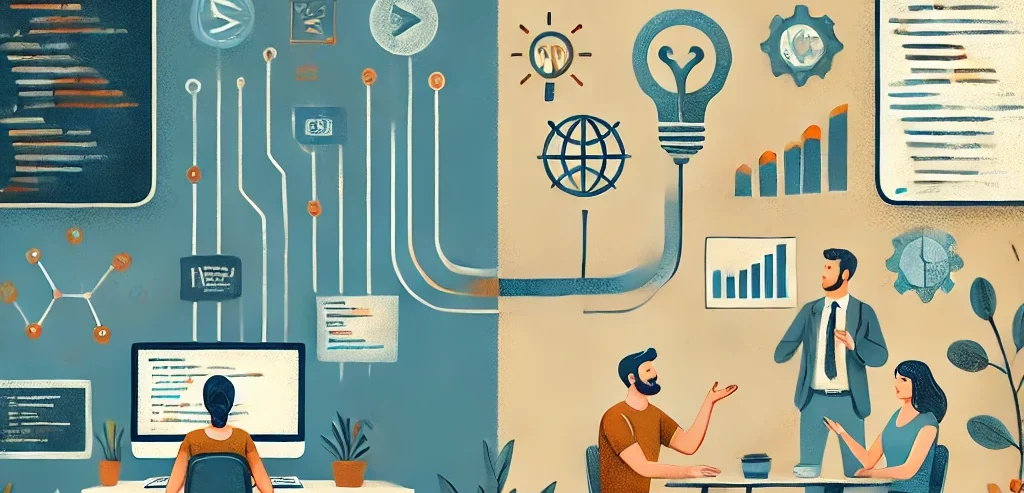Reflections on My Transition from Programming to Marketing
Today I want to share some personal experiences and thoughts from my journey as a programmer and why I eventually moved away from full-time development and into marketing.
This isn’t just a story about career change; it’s about self-discovery, navigating challenges, and finding what truly resonates with you.
From Code to Communication
Let’s start with the obvious: programming is an intense, solitary activity. I remember during the first or second year of the pandemic, I was working from home, coding for hours without saying a single word to anyone. Some days, I didn’t hear my own voice until the evening when I’d call a friend, and that would be the first time I’d spoken all day. For someone like me, who thrives on communication and interaction, this was unsettling.
In contrast, marketing and problem-solving involve constant input, collaboration, and communication. Every day is dynamic, filled with conversations, understanding people’s needs, and solving problems in real time. That’s why I made the switch—it was more aligned with who I am.
The Struggle of Decision Making in Programming
One of the biggest challenges in programming, especially when you’re working on a new project, is the overwhelming freedom. You have countless technologies, frameworks, and libraries to choose from. It’s like staring at a blank page, unsure what to write. This freedom, while exciting, often leads to anxiety about making the wrong decision.
When I was just starting out, this feeling was overwhelming. You’re constantly torn between choosing what you know versus trying out something new. My advice to anyone facing this dilemma is simple: stick with what you know for projects with tight deadlines, and experiment on your personal projects.
It’s easy to get lost in endless options, but the truth is, the more you simplify your decision-making process, the better you’ll get at it. You’ll find that with time, decision-making becomes faster and less daunting.
The Art of Quick Decision Making
This brings me to another point—learning to make decisions quickly. It’s something you have to practice, whether in life or in programming. The faster you can make decisions, the faster you can move on to the next task or project. It’s like cooking with the ingredients you have in your fridge—you can’t waste time dreaming up fancy meals if you don’t have the right ingredients. You make the best dish you can with what’s available.
This skill isn’t just for work; it applies to everything in life. Sometimes, making a decision—any decision—is better than being paralyzed by fear of making the wrong one. You’ll learn more from making mistakes than from everything going perfectly. And that’s where true growth happens.
The Importance of Relaxation in Programming
Here’s something that doesn’t get talked about enough: learning to relax while working. I’ve rarely met colleagues who are truly relaxed at work. And I don’t mean lazy or careless—I’m talking about feeling comfortable enough to try new things, experiment, and speak your mind without fear of failure.
I blame a lot of this on the traditional education system. We’re trained to study, study, study, and then take a test. If you don’t know the answer, you fail. This mindset carries over to work, where people are afraid to admit when they don’t know something.
The reality is, you don’t have to know everything. What’s more important is having the confidence to say, “I don’t know this right now, but I’ll figure it out.” That’s the mindset that allows you to approach challenges with curiosity rather than fear.
Conclusion: Embrace the Unknown
So, to wrap things up, if there’s one thing I’ve learned in both programming and marketing, it’s this: it’s okay not to have all the answers. What matters is your willingness to figure things out as you go. Whether you’re working on a complex code problem or trying to solve a marketing challenge, the key is to approach it with curiosity, patience, and a bit of boldness.
Thanks for sticking around and reading through my reflections. I hope this resonated with some of you who might be going through similar experiences. Remember, it’s not about what you know right now—it’s about your mindset and your drive to figure things out as you go. Until next time!


Comments
Leave a Comment